
Recalling Amir Khan Muttaqi’s Visit To Darul Uloom Deoband
Recalling Amir Khan Muttaqi’s Visit To Darul Uloom Deoband
By: Abdul Hameed Yousuf Qasmi
Teacher, Department of English Language & Literature
Darul Uloom Deoband
Rabi’us Sani 18th, 1447 Hijri, brought a cherished blessing for us, the associates of Darul Uloom Deoband. We witnessed the historic visit of Maulana Amir Khan Muttaqi, the Minister of Foreign Affairs of the Islamic Emirate of Afghanistan.
Maulana Muttaqi, on his seven-day visit to India, came to Darul Uloom as a seeker of Ilm-e-Deen. Hazrat Maulana Mufti Abul Qasim Nomani (DB), Shaikhul Hadith and rector of Darul Uloom Deoband, conferred upon him the Ijazat of Hadith, thus allowing him to be among the fortunate beneficiaries of the seminary’s timeless legacy.
As someone who graduated from Darul Uloom Deoband back in 1426 Hijri / 2005 AD, I could feel the joy and blessedness that must have enveloped Maulana Muttaqi when he was granted the Ijazat. Seated humbly beside Hazrat Mufti Abul Qasim Nomani, the foreign minister gazed at the walls of the (New) Darul Hadith with visible reverence and deep emotion. In his brief address on the occasion, he termed Darul Uloom his “Maadar-e-Ilmi” (alma mater).
Later in the day, while speaking about the centuries-old bond between India and Afghanistan, Maulana Amir Khan Muttaqi paid glowing tribute to Darul Uloom, acknowledging its religious, spiritual, educational, academic, and reformatory contributions — a recognition that reaffirmed the institution’s enduring role in shaping minds and hearts across the globe.

In truth, the services of Darul Uloom Deoband reach far beyond linguistic and geographical boundaries. Over the years, a large number of Afghan students have sought knowledge within its walls.
Darul Uloom Deoband began as a small madrasa under a pomegranate tree in Deoband’s Chhatta Masjid on 15 Muharram 1283 Hijri / 31 May 1866. Today Darul Uloom owes its establishment and subsequent progress to the sincere efforts of great scholars and notables, including Hazrat Maulana Muhammad Qasim Nanautavi (RA), Hazrat Haji Sayyid Muhammad Abid (RA), Hazrat Maulana Rashid Ahmad Gangohi (RA), Hazrat Haji Fazl-e-Haque Deobandi (RA), Hazrat Maulana Yaqub Nanautavi (RA), Hazrat Maulana Rafeeuddin Deobandi (RA), Hazrat Maulana Fazlur Rahman Usmani (RA), Hazrat Maulana Mahtab Ali Deobandi (RA), Hazrat Shaikh Nihal Ahmad Deobandi (RA), and Hazrat Maulana Zulfiqar Ali Deobandi (RA).
During the 159 years since its inception, Darul Uloom Deoband has produced grand scholars; some of the notable ones include Shaikhul Hind Hazrat Maulana Mahmood Hasan Deobandi (RA), Hazrat Maulana Sayyid Husain Ahmad Madani (RA), Hazrat Maulana Ashraf Ali Thanvi (RA), Hazrat Allama Muhammad Anwar Shah Kashmiri (RA), Hazrat Maulana Habibur Rahman Usmani (RA), Hazrat Maulana Shabbir Ahmad Usmani (RA) and Hazrat Maulana Qari Muhammad Tayyib Qasmi (RA).
The title “Qasmi,” given to graduates of Darul Uloom Deoband, refers to Hazrat Maulana Muhammad Qasim Nanautavi (RA), the seminary’s intellectual guide and principal founder.
Darul Uloom’s history is rich with stories of transformation — of turning ordinary individuals into extraordinary figures, of shaping unlettered children into revered scholars, and of guiding the religiously or spiritually wayward into becoming radiant torchbearers of faith. Darul Uloom is, without doubt, an enduring asset for the nation and the Ummah.
These noble services, intertwined with its pivotal role in India’s freedom struggle and later in nation-building, have earned it deep respect from personalities of national and international stature. Time and again, great leaders and scholars have walked through its gates. Some of these visitors include Maulana Abul Kalam Azad (RA), the first Education Minister of independent India, in 1950; Dr. Rajendra Prasad, the first President of India, in 1957; Fakhruddin Ali Ahmed, the President of India, in 1976; Muhammad Zahir Shah Durrani, the King of Afghanistan, in 1958; Muhammad Anwar Sadat, the President of Egypt, in 1955; Shaikh Abd al-Fattah Abu Ghuddah, in 1962; Sheikh Abdel-Halim Mahmoud, the Grand Imam of Egypt’s al-Azhar, in 1975; Sheikh Dr. Abdallah bin Abdel Mohsen At-Turki, Provost of Imam Muhammad ibn Saud Islamic University, in 1987; Shaikhul Islam Mufti Muhammad Taqi Usmani, in 2010; Mahbubul Ulama Was-Sulaha Maulana Peer Zulifqar Ahmad Naqshbandi, in 2011; Sheikh Abdul Rahman ibn Abdul Aziz al-Sudais, the Chief Imam of Masjid al-Haram in Makkah, in 2011; Saud ibn Ibrahim ibn Muhammad al-Shuraim, the Imam of Masjid al-Haram in Makkah, in 2012; and Sheikh Saleh bin Mohammed Al Talib, the Imam of Masjid al-Haram in Makkah, in 2016.
On 11 October 2025, Maulana Amir Khan Muttaqi became the latest addition to this distinguished list of respected visitors. His visit to Deoband came just days after the news about it broke across the media. Darul Uloom Deoband undertook every possible arrangement to welcome him with due honour. A variety of programs involving both teachers and students were carefully planned, each designed to make the occasion memorable. When the long-awaited day of his visit arrived, the campus of Darul Uloom awoke in a festive spirit, its atmosphere charged with excitement and fervour.
The students, including those from the Department of English and Literature, went through their morning classes reluctantly, their minds already on the historic event that lay ahead. After about 9:30 in the morning, a spirit of vibrant welcome swept over Darul Uloom. As the caravan of Maulana Amir Khan Muttaqi approached and entered the premises, the air of Darul Uloom Deoband resonated with the gentle melody of welcoming couplets, elegantly broadcast in Persian — marking the significance and honour of the occasion.

In front of the Shaikhul Hind Library — named in honour of Shaikhul Hind Maulana Mahmood Hasan Deobandi (RA) — the stage was meticulously prepared for a ceremonial welcome. Afghanistan’s foreign minister was to receive a guard of honour befitting the occasion. Among those assembled to greet him were Hazrat Maulana Abdul Khaliq Madrasi (DB) and Hazrat Mufti Muhammad Rashid Azmi (DB) — the two deputy rectors of Darul Uloom Deoband—joined by several other great personalities.
I, along with some students from my English Department — Maulvi Abdul Basit, Maulvi Shafeeul Haque, Maulvi Mohammad Shoaib Haridwari, Maulvi Azhar Sadiq, Maulvi Ahsan Javed, Maulvi Mohammad Hedayatullah, Maulvi Mohammad Shoaib Muzaffarngari, Maulvi Mohammad Faizan, and Maulvi Rizwan Mahmoud — was waiting within the barricaded area where the stage had been set for the red-carpet welcome of the distinguished guest.
Our wait was prolonged. One of my students had long ago informed us about the entry of the caravan through the GT Road Gate. Normally, it is barely a five-minute walk from the Gate to the Shaikhul Hind Library. The unusual delay in the caravan’s arrival at the venue reminded us of Maulana Muttaqi’s statement.
Just days earlier, in response to a media question regarding the purpose of his visit to Deoband, he had said:
“What do people do after visiting Deoband? They perform Salah, meet the teachers, and interact with the students. Deoband stands as a great historical center of Islamic education. Its scholars have long maintained close ties with the scholars of Afghanistan, sharing the same maslak and scholarly traditions. We regard Deoband as both an academic and spiritual center. Our desire is to meet the teachers and students there and to renew those historic bonds. Just as our students travel to India to pursue modern sciences, we hope that, in the same way, they will also come here to seek Deeni knowledge.”
One of my students chuckled, “Perhaps he is performing Salah in Masjid Rasheed.” Another student added, “If he were to perform Salah, he should do it in Masjid Chhatta.” This masjid is the place where Darul Uloom Deoband began, with Mahmud Deobandi being its first teacher and (Shaikhul Hind Hazrat Maulana) Mahmood Hasan Deobandi its first student.
But the guess that Maulana Muttaqi was offering Salah turned out to be untrue. The delay was due to the huge crowd of admirers that had accompanied the caravan right from the GT Road Gate. While traversing its way through Darul Qur’an, Shaikhul Islam Manzil, Afriqi Manzil, Azami Manzil and then the south-eastern gate of Masjid Rasheed, the caravan had to move at a snail’s pace.
At last, our long wait was over. We watched as the vehicles rolled through the Masjid-e-Rasheed Gate — situated beside the mosque’s south-western wall — and entered the access-controlled zone. Almost simultaneously, the massive crowd behind them surged forward, spilling into the secured area.
Meanwhile, the students at Babuz Zahir — one of the four main gates of Darul Uloom Deoband, constructed in 1359 Hijri (1940 AD) and named after Muhammad Zahir Shah Durrani, the King of Afghanistan — who had until then remained patient and composed, could no longer contain their excitement. From that direction too, a large crowd began moving toward the Shaikhul Hind Library. Their hearts brimming with deep affection, they seemed ready to go to any lengths for a fleeting glimpse or a handshake with Maulana Amir Khan Muttaqi.
The men in uniform, present inside, attempted to control the swelling crowd at both gates. Yet, vastly outnumbered, they soon had to yield. The fast-moving students kept pressing toward the welcome area. Before long, the platform meant for the ceremonious reception was completely surrounded by an immense crowd, heightening the concerns of the already apprehensive security officers. The planned guard of honour had to be cancelled at the last moment.
Instead, the guest proceeded directly into the (New) Darul Hadith, where an eagerly waiting gathering — mainly composed of the students of Daura Hadith — greeted him warmly. Afghanistan’s foreign minister sat beside Hazrat Mufti Abul Qasim Nomani (DB), the Shaikhul Hadith. He sat like a student. In this surreal moment, the students of Daura Hadith Shareef 1447 Hijri found themselves with an unexpected and distinguished classmate in the form of Maulana Amir Khan Muttaqi.

Within the classroom of Darul Hadith, a remarkable scene unfolded: the high-ranking government official, moved by honour, veneration, and gratitude, bent down to kiss the forehead of a humble and grounded Deobandi scholar, the Shaikhul Hadith and Rector of Darul Uloom Deoband Hazrat Maulana Mufti Abul Qasmi Nomani (DB) — an expression of deep respect captured in a singular, powerful gesture.
The pre-noon, now noon, session in the Darul Hadith was originally scheduled to be followed by another program later that afternoon. This next gathering, planned in the new auditorium of Darul Uloom, was to feature an address by Maulana Amir Sahab to the assembled teachers and students. Unfortunately, the event had to be cancelled, much to the disappointment not only of those at Darul Uloom but also of the large crowd that had gathered specifically to participate in the program.
As teachers, we were offered the opportunity to meet Muttaqi Sahab at Darul Uloom’s Guest House. After a series of earlier disappointments, yet encouraged and guided by Maulana Tauqeer Ahmad Qasmi Kandhlavi Naqshbandi, HoD of the English Department, I finally managed to reach the Guest House. Our colleague, Maulana Abdul Malik Qasmi, was already present there. I later learned that a meeting with the minister had been underway.
Hazrat Maulana Arshad Madani (DB), the Sadrul Mudarriseen (head teacher) of Darul Uloom Deoband, had talked about the long-standing relations between Afghanistan and India, especially highlighting Afghanistan’s significant role during India’s freedom struggle. It was in Afghanistan that the Provisional Government of India was formed on 1 December 1915, consisting of Raja Mahendra Pratap as President, Maulana Barkatullah as Prime Minister, Maulana Ubaidullah Sindhi as Home Minister, Maulana Bashir as War Minister, and Champakraman Pillai as Foreign Affairs Minister.
Although I felt a sense of deprivation upon discovering the meeting I could not attend, I was simultaneously grateful and blessed to have had the chance to meet Maulana Amir Khan Muttaqi in person.
When my eyes fell upon the down-to-earth yet powerful statesman of Afghanistan, I was overwhelmed with emotion. This was the first opportunity for me to meet a foreign minister. His radiant face reflected a blend of struggle, confidence, humility, and sincerity. Everyone present in the Guest House, including Maulana Tauqeer Ahmad Qasmi, approached him in turn to shake hands and embrace him. He greeted each person with the same affection and humility. I, too, was blessed to shake his hand and embrace him warmly.
Regrettably, our time together was brief. Before long, he departed, and our eyes followed him until he faded from view, leaving hearts heavy with longing.
وصل کا دن اور اتنا مختصر
دن گنے جاتے تھے اس دن کے لیے
You May Also Like
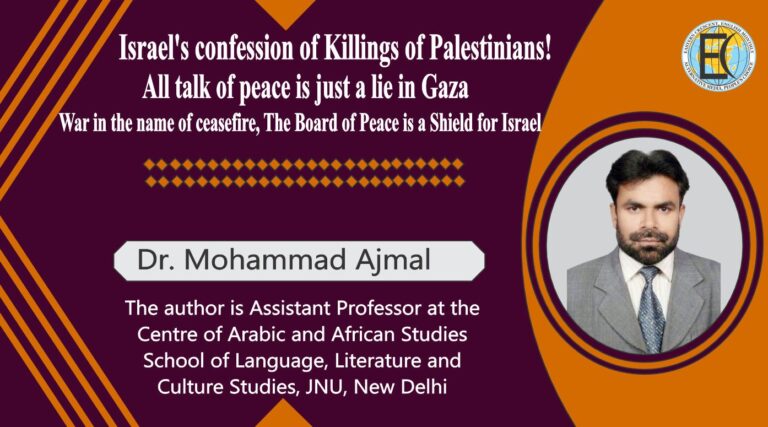 Breaking News
Breaking NewsIsrael’s confession of Killings of Palestinians! (War in the name of ceasefire, The Board of Peace is a Shield for Israel)
Israel’s confession of Killings of Palestinians! All talk of peace is just a lie...
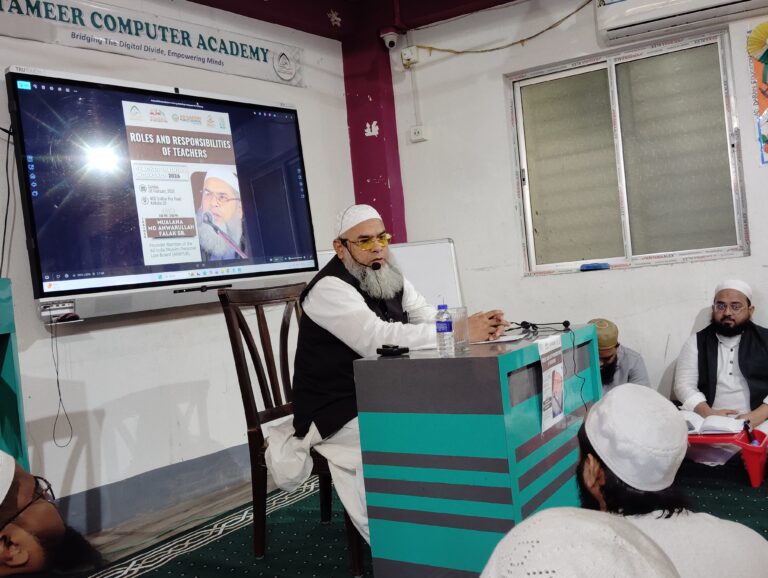 Breaking News
Breaking NewsAd Darain Education Centre Successfully Conducts 3 Days Teacher Training Workshop
Ad Darain Education Centre Successfully Conducts 3 Days Teacher Training Workshop EC News Desk...
 Breaking News
Breaking News₹10 Lakh Government Grant Sanctioned under Madrasa Modernisation Scheme
₹10 Lakh Government Grant Sanctioned under Madrasa Modernisation Scheme Applications open until November 13;...
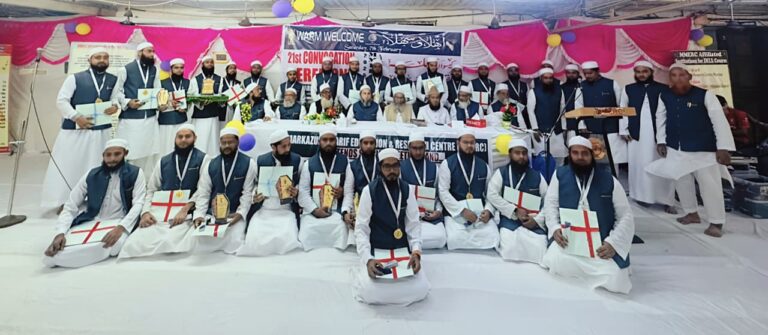 Breaking News
Breaking NewsGrand Convocation Ceremony Held at MMERC, Mumbai
Grand Convocation Ceremony Held at MMERC, Mumbai EC News Desk 7 February 2026 Mumbai:...
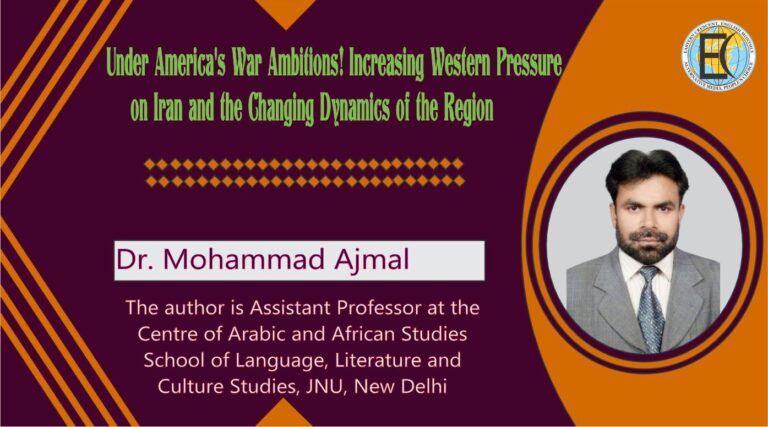 Breaking News
Breaking NewsUnder America's War Ambitions! Increasing Western Pressure on Iran and the Changing Dynamics of the Region
Under America's War Ambitions! Increasing Western Pressure on Iran and the Changing Dynamics of...
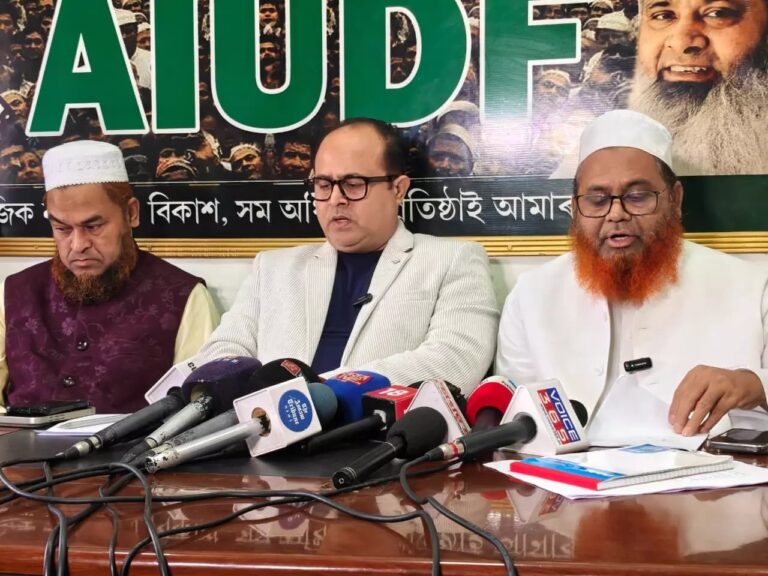 Breaking News
Breaking NewsAIUDF Flags Irregularities in Electoral Roll Revision; CEO Assam Seeks Action as per Law
AIUDF Flags Irregularities in Electoral Roll Revision; CEO Assam Seeks Action as per Law...

Comments (1)
Leave a Comment
A beautifully crafted and deeply evocative narrative that illustrates the sanctity, scholarship, and enduring legacy of Darul Uloom Deoband. It simultaneously portrays the humility, reverence, and heartfelt admiration of the esteemed guest, Mawlawi Amir Khan Muttaqi—the FM of the Islamic Emirate of Afghanistan. Woven with elegant prose and rich emotional resonance, the account stands as a timeless tribute to this revered cradle of knowledge, celebrating its lasting influence and the spiritual devotion it continues to kindle in hearts across generations.
~Muhammad Raihan Anwar